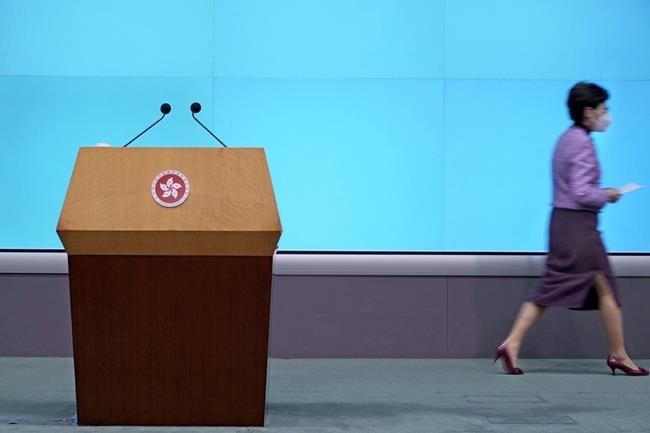HONG KONG (AP) — Hong Kong leader Carrie Lam said Monday she wouldn’t seek a second term after a rocky five years marked by huge protests calling for her resignation, a security crackdown that has quashed dissent and most recently a COVID-19 wave that overwhelmed the health system.
Her successor will be picked in May and the city's security chief during the 2019 protests is among the possible choices.
“I will complete my five-year term as chief executive on the 30th of June this year, and I will also call an end to my 42 years of public service,” Lam said at a news conference. She thanks her team of local officials and the central authorities in Beijing, and said she plans to spend more time with family, which is her “sole consideration.”
Speculation had swirled for months about whether she would seek another term, but she said that her decision had been conveyed to the central government in Beijing last year and was met with “respect and understanding.”
“Less than two years into my chief executive term, because of the anti-extradition bill and because of interference from foreign forces and also the attack of COVID-19, I was under great pressure,” Lam said. “However the motivation for me to press on was the very staunch support behind me by the central authorities.”
She presided over a period in which Beijing firmly established control over the former British colony that was returned to China in 1997. For years, the city rocked back and forth between calls for more freedom and growing signs of China extending its reach into the city, even after Hong Kong was promised 50 years of freedom to govern itself semi-autonomously from the mainland.
Lam’s popularity sharply declined over her five-year term, particularly over legislation that would have allowed crime suspects to be extradited to mainland China for trial and later over her leadership during the 2019 protests that saw violent clashes erupt between police and protesters.
She also strongly supported the national security law initiated by Beijing and implemented by her government that was seen as eroding the “one country, two systems” framework that promised after the handover from Britain that city residents would retain freedoms not found in mainland China, such as a free press and freedom of expression.
The security law and other police and court actions in the years since have virtually erased the city's pro-democracy movement, with activists and the movement's supporters either arrested or jailed. Others have fled into exile.
Hong Kong media say the city's No. 2 leader John Lee is likely to enter the race to succeed Lam. Chief Secretary Lee was the city’s head of security during the 2019 protests, and is known for his support for the police force during the protests and his tough stance against protesters.
Hong Kong’s leader is elected by a committee made up of lawmakers, representatives of various industries and professions, and pro-Beijing representatives such as Hong Kong deputies to the China’s legislature. One of the unfulfilled demands of the 2019 protests was direct election of the city’s chief executive.
The election for the chief executive had been set on March 27 but was postponed until May 8 as the city endures its worst coronavirus outbreak of the pandemic.
Lam said that holding the polls as originally scheduled would pose “public health risks” even if a committee of only 1,462 people is involved.
Lam previously served as chief secretary, secretary for development and other roles in civil service. She earned the nickname “good fighter” for her tough stance and refusal to back down in political battles.
Lam renounced her British nationality in 2007 when she was appointed secretary for development. Her husband and two children have retained their British nationalities.
___
Soo reported from Singapore. AP writer Ken Moritsugu contributed from Beijing.
Zen Soo And Vincent Yu, The Associated Press


